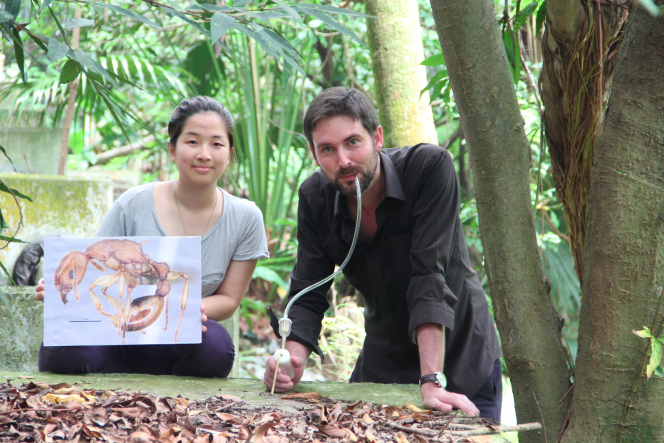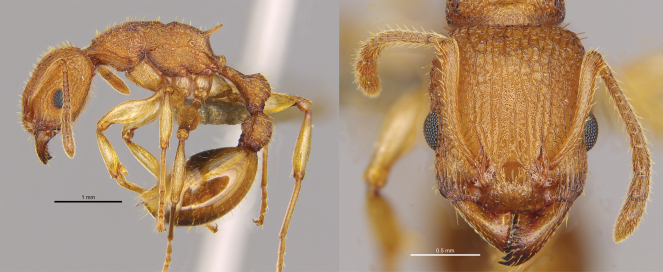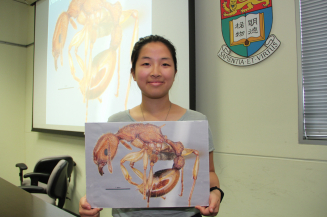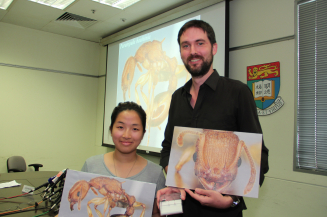Media
New ant species Paratopula bauhinia (Golden Tree Ant) described from Hong Kong by HKU biologists
01 Aug 2016

Ms Ying Luo and Dr Guénard at the Lung Fu Shan Lung site where the Golden Tree Ant was first discovered
The Insect Biogeography and Biodiversity research group led by Dr Benoit Guénard at the School of Biological Sciences, the University of Hong Kong (HKU) has recently described and named a new species of ant from Hong Kong, Paratopula bauhinia, or the rare “Golden Tree Ant” in Asian Myrmecology, a peer-reviewed, yearly journal dedicated to the study of Asian ants.
A newly described species is a species previously unknown to Science, i.e. it has been discovered on Earth for the first time. The person who describes it has the right to name it. The new ant species discovered by the research team represents the 22nd ant species described from Hong Kong since 1858. The last one was in 2000. Descriptions of earlier species had to be dated back to 1928.
While some might think that new species are only discovered in deep pristine forests, this new ant species was found just a few hundred meters from HKU campus on the foothill of Lung Fu Shan Country Park during a night field course. The unusually large size of the ant (about 7mm long) and its golden appearance piqued the curiosity of Ms Ying Luo, a research assistant of the School of Biological Sciences, to collect it for further detailed inspection. Back at the laboratory, she and Dr Guénard realised that this ant was quite special, not only did the specimen represent the first record of the ant genus Paratopula for Hong Kong and southern China, it also represented a new species for science. Despite intensive collection efforts since its original collection, it has only been found at Lung Fu Shan Country Park and so the ant can be considered as endemic to Hong Kong Island. This new species is described in Asian Myrmecology by Ms Luo and Dr Guénard, along with the first description of the queen of another arboreal species, Rotastruma stenoceps.
The newly described species has been given the scientific name Paratopula bauhinia, in reference to the Bauhinia flower, symbol of Hong Kong. Indirectly, the name also refers to the arboreal nature of the ant. Indeed, this species seems to live on trees and forage only at dusk and at night where it can be found on lower vegetation and human-made structures. Its beautiful golden colour and relative large size, similar to a grain of rice, makes this discovery all the more remarkable. Considering the number of hikers, joggers and visitors to Lung Fu Shan Country Park and its ease of access, this ant could have been found by anyone curious of nature and new discoveries.
The discovery of Paratopula bauhinia in Hong Kong, as well as three other new species from Singapore earlier this year by the Insect Biodiversity and Biogeography research group illustrates how little we know about insect biodiversity surrounding us and the pressing need for discovering it. In times of a biodiversity crisis, with major parts of natural habitats disappearing, describing new species before they disappear is particularly important. “With probably 80% of life still unknown to Science, species descriptions are more than ever paramount to the study and protection of biodiversity, including in Hong Kong,” said Dr Guénard.
The Insect Biogeography and Biodiversity Laboratory at the School of Biological Sciences is a relatively new research group at the University of Hong Kong. The group works on biodiversity patterns of insects and how human activities directly or indirectly modify species distribution and composition in Hong Kong and South East Asia. While this is the first new ant species described from Hong Kong by the Insect Biogeography and Biodiversity Laboratory, several other specimens have already been identified to represent unique new species and should be described in the coming years.
Article available at:
http://www.asian-myrmecology.org/publications/am08/Luo-and-Guenard-2016-am008016.pdf
Images shown above can be downloaded via the following link: http://www.scifac.hku.hk/news/media?page=1
To learn more about the Insect Biodiversity and Biogeography Laboratory and its research, please visit: http://benoitguenard.wordpress.com/
For media enquiries, please contact Ms Cindy Chan, Senior Communication Manager of HKU Faculty of Science (tel: 3917 5286/ 6703 0212; email: cindycst@hku.hk).



